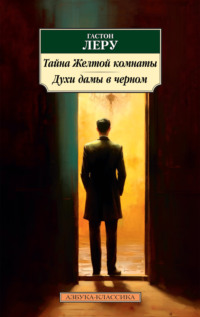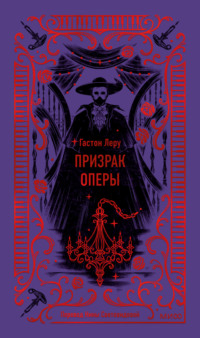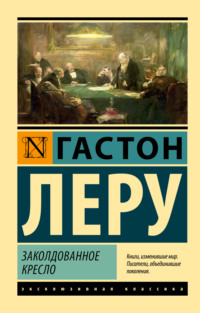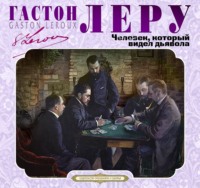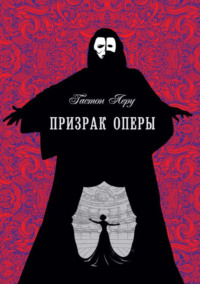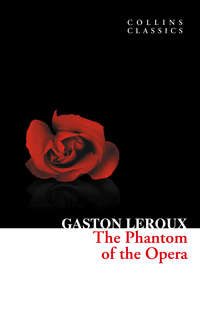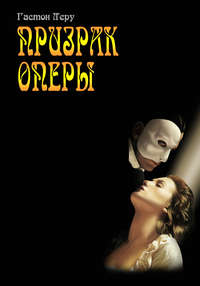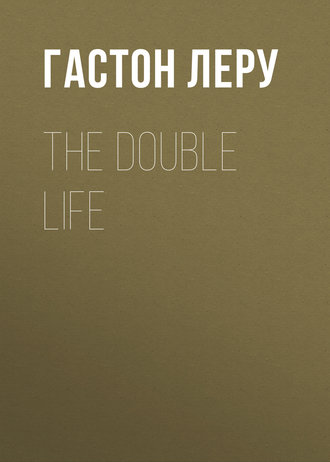 полная версия
полная версияThe Double Life

Gaston Leroux
The Double Life
HISTORICAL PREFACE
I WAS passing through the waiting-room of the Morning Journal on a certain evening last year when my attention was drawn to a man seated in a corner. He was dressed in black and his appearance was that of the deepest dejection. In fact upon his face I read the most melancholy despair.
He was not weeping, his eyes were dry and almost expressionless and received the impression of exterior objects like motionless ice. He had placed upon his knees a small oaken chest, ornamented with ironwork. His hands were crossed over this object and hung down, accentuating his dejected appearance.
An attendant told me that he had been awaiting my arrival there three long hours without a movement, without so much as a sigh. I went towards him, and announcing myself, I invited him to enter my office. I showed him a seat, but instead of taking it he came straight to my writing-desk and placed the little oaken chest on it. “Sir, this chest belongs to you,” said he, and his voice seemed far away and indistinct. “My friend, M. Théophraste Longuet, commissioned me to bring it to you. Take it, sir, and believe me, your servant.” As he spoke the man bowed and made a motion toward the door. I stopped him, however, and said: “Why, do not go, I cannot receive this box without a knowledge of its contents.” He replied: “Sir, I do not know what it contains, it is locked and its key is lost. You might have to break it open to find out the contents.” I replied: “Then at least I would like to know to whom I am indebted for bringing it to me.”
“My friend, M. Théophraste Longuet, called me Adolphe,” replied the man, in a voice so melancholy that it seemed to grow more faint and indistinct with each syllable.
“Well, if M. Longuet had brought me the chest himself, he would most certainly have told me what it contains; I expect that M. Longuet, himself.”
“I also, sir,” said the man, “but M. Théophraste Longuet is dead, and I am his sole executor.”
By this time he had edged his way to the door, and having said these words, he opened the door and departed. I was taken back by this sudden move and stood staring at the door, then at the chest. Collecting myself I hastily followed the man, but could find no trace of him… he had disappeared.
Opening the chest I found it contained a bundle of papers, which at first I regarded with indifference, but which I presently began to examine with greater interest. The deeper I penetrated the more mysterious they appeared to be and the more unexpected were the adventures revealed. In fact, so strange did they seem that I at first could not believe my intelligence, and if the proof had not been in front of me I never would have been convinced of their reality.
It was some time before I could bring myself to realize my position regarding these papers. M. Théophraste Longuet had made me heir to this chest and to the mysteries lying therein. In fact, the secrets of his life.
These papers were written in the form of memoirs and were voluminous. They related with the minutest detail, all the incidents of an exceptionally dramatic existence. M. Théophraste Longuet had by the discovery of a document two centuries old acquired the proof that Louis Dominique Cartouche, the most cunning criminal in the annals of French crime, and he, Théophraste, were one and the same person. This was indeed a most startling discovery and valuable, for it also put me on the track of the treasures of the famous Cartouche.
He had frequently confided in me facts about his peculiar life, but an untimely death, certain terrible events related in these documents, had prevented him from telling me all. We had been great friends. I had written for a journal he had called his “favorite organ.” He had chosen me as his companion and confidant from among many other journalists, not because of any superiority of intellect, but rather, as he used to say, “because a reliable level-headed friend is worth twenty acquaintances, and he found me reliable.” There was much significance in this word, “level-headed,” as you will learn as you read this narrative.
Having thoroughly examined the papers, I immediately took them to my manager, who was a keen business man. He did not hesitate for a moment to find the “Treasures of Cartouche” a valuable piece for his paper, and it is now a matter of common knowledge how curiously the sum of twenty-five thousand francs, divided into seven sums, were hidden in and around Paris, and how the author of these lines in the history of the chest which appeared in print in the month of October, in the year 1903, * touched lightly upon the story found therein.
* This date is very important, for it established the fact that my authentic history of Cartouche had appeared before Mr. Frank Brentano’s book, and that one two books the day after that of Mr. Maurice Bernard.
I have believed it my duty toward the public, and also to the memory of Théophraste Longuet, to publish in volume the authentic history of the reincarnation of Cartouche, written exclusively from the documents found in the little oaken chest, a plain narrative, unembellished by all that which I, poor journalist, had added for the chance reader of my journal.
The reader will find more than a mere treasure. The documents are of the greatest literary value, inasmuch as they contain proof of things hitherto only dreamt of. It is certain that many people imagining themselves of superior intellect will doubt and possibly scoff at many of these mysteries.
The oaken chest contained the secret of the tomb; it also contained the history of the Talpa people written by no less an authority than M. Milfroid, Commissioner of Police, who remained for three weeks with M. Théophraste Longuet in the subterranean home of those monsters. This last infernal comedy would most certainly have met with incredulity had not it been vented by one of the most honest and intellectual of Police Commissioners. M. Milfroid was a most noble and accomplished character, and he could place music, painting, sculptors among his accomplishments.
Now before closing this preface I must warn my readers that they will find many strange things in the narrative, weird and almost supernatural. And I would say that unless he is possessed with great level-headedness, he must not read the secrets of the Life of Théophraste Longuet.
CHAPTER I
M. Théophraste Longuet Wishes to Inform Him-self and Visits Historical Monuments
THE strange adventures of M. Théophraste Longuet, which ended so tragically, originated in a visit to the prison of the Conciergerie, on the 28th of June, 1899. Therefore this history is modern; but the writer would say that, having read and examined all the papers and writings of M. Théophraste Longuet, its recentness does not detract from its sensational character.
When M. Longuet rang the bell of the Conciergerie he was accompanied by his wife, Marceline, and M. Adolphe Lecamus. The latter was a close friend. It was his physique that had attracted M. Longuet. He was not handsome, but was tall and well built, and every movement showed that strength which M. Longuet lacked. His forehead was broad and convex, his eyebrows were heavy and straight. He had a habit of every now and then lifting them gracefully to express his disdain of others and his confidence in himself. His grey eyes twinkled under near-sighted spectacles, and the straight nose, the proud arch of the underlip, surmounted by a dark, flowing mustache, the square outline of his chin and his amaranthine complexion, all combined to accentuate his strong appearance.
He had been employed as postmaster at Turin, and had traveled considerably. He had crossed the sea. This was also an attraction to M. Longuet, who had never crossed anything, unless it was the Seine.
M. Longuet had been a rubber stamp manufacturer, but had made sufficient money to retire at an early age. He was the antithesis of Adolphe in build and character. His face showed no marked intelligence, and his slight build lent almost insignificance to his appearance. He had, however, imagination, and he used to laughingly say to Adolphe: “Even if I haven’t traveled, I run just as much risk in walking the streets of Paris as one who crosses the ocean in ships. Might not houses collapse or pots of flowers fall on one’s head?” Thus he lived a monotonous existence, relieved only by the morbid workings of his mind.
Before his retirement he had worked hard and had little time to study, therefore, now he had leisure, it occurred to him to occupy his time in improving his mind. It was with this intention that we find him visiting the various buildings of historic interest around Paris.
On ringing the bell of the Conciergerie the iron door turned heavily on its hinges. A warden shaking the keys demanded of Théophraste his permit. He had anticipated this and had received it that morning from the Prefect of Police. He tendered it with satisfaction, looking around at his companion with the confidence of anticipations realized.
The gate-keeper turned the little company over to the Chief Warden, who was passing at the time. Marceline was much impressed, and as she leaned on Adolphe’s arm, thought of Marie Antoinette’s dungeon, the Grevin Museum, and all the mysteries of this famous prison. The Chief Warden said: “Are you French?” to which Théophraste replied, laughingly, for he was typically French: “Do we look like English people?”
“This is the first time,” explained the Chief Warden, “that any French people have asked permission to visit the Conciergerie. French people are indifferent to things of interest in their own country.” “They are wrong, sir,” replied Théophraste, wiping his spectacles. “In the monuments of the past we have foundations of the future.” This idea rather pleased him, and he looked for approval to Adolphe and Marceline. He continued following the Warden. “As for me, I am an old Parisian and would have visited all these places of interest long ago but for my work. I have worked hard at my trade and the only leisure I got was when I went to bed. That time is over now, sir, and now is the time for me to educate myself,” and he struck the century-old pavement with the end of his green umbrella.
Passing a small door and a large wicket, they descended some steps and were in the guard-room. The first thing to draw attention made Adolphe laugh, Marceline blush, and Théophraste turn in disgust. It was the capital of a Gothic column carved to symbolize the story of Abelard and Heloise. Abelard was pleading with the Carion Fulbert for his clemency, while the latter was taking the child from Heloise.
“It is strange,” said M. Longuet, “that in the name of art the Government should tolerate such obscenities. That capital is a disgrace to the Conciergerie and should be removed.” M. Lecamus did not agree, and said: “Many things are excusable in art if they are done in the right spirit.”
However, the subject was dropped and they were soon interested in other parts of these old historic buildings. The Chief Warden conducted them through the Tower of Cæsar, into the Silver Tower, or Tower of Bon Bee. They thought of the thousand of illustrious prisoners who had been incarcerated in prison for years. Marceline could not keep from thinking of the martyred Marie Antoinette, of Elizabeth, and the little Dauphin, and of the waxen gendarmes in the museum, who watched over the Royal family. All this impressed her, and her mind was continually carried back to those stirring times. The Silver Tower had been transformed into a record office, and the modern writing desks were in striking contrast to the old medieval walls. Returning through the guard-room, they directed their steps towards the Bon Bee Tower. Théophraste had read about this tower and imagined he knew it well, so wishing to appear well informed, asked of the Warden, “Is it not there, sir, that the last meal of the Girondists was served? You ought certainly to tell us exactly where to find the table, and also the place which Camille des Moulins occupied.” The Warden replied that the Environdists had dined in the chapel and that they would soon visit it.
“I wish to know Camille des Moulins’ place,” said Théophraste, “because he was a friend of mine.”
“And mine also,” said Marceline, with a look towards Adolphe, which seemed to say, “Not as much as you, Adolphe.”
But Adolphe laughed and said Camille was not a Girondist, he was a Franciscan friar, a friend of Danton, a Septembrian.
Théophraste was vexed, and Marceline protested that if he had been anything of the sort Lucille would not have married him. Adolphe did not insist, but as they had by now reached the chamber of torture, he feigned condescendingly to be interested in the labels which adorned the drawers decorating the walls, “Hops,” “Cinnamon,” “Spice,” etc.
“Here is the room in question. They have transformed it into the doctor’s store-room.”
“It is just as well, perhaps,” said Théophraste, “but not so impressive.”
Adolphe and Marceline were of the same opinion. They were not at all impressed. Here was the famous torture chamber. They expected something else. They were disillusioned. Outside, when viewed from the court of the Sundial, the formidable aspect of those old feudal towers, the last vestige of the palace of the French monarchy, momentarily brought fear and awe to their minds. That prison had stood a thousand years, had known so many tragedies, death rattles, legendary miseries, hidden secrets. It seemed that one only had to step inside to find an inquisition court in some dark corner, damp and funereal. Here seemed to be all the tragedies of the history of Paris, as immortal as the very walls.
What a disillusion here in these towers with a little plaster and paint they had made the office of the Director of Records, the store-room of the prison doctor. One could carouse here where once the hangman held sway. One could laugh where only the cries of the tortured were heard.
Now there would have been nothing unusual about this visit to the Conciergerie but for a very extraordinary incident which occurred after the party had left the torture chamber. The incident was weird and inexplicable, and while I read M. Longuet’s own description of it, I confess I found it impossible to believe. Therefore I went to the Chief Warden, who had shown the party round the prison, and asked for his account of the incident.
He gave it to me in the following words:
Sir, the affair passed as usual, and the lady, the two gentlemen and I visited the kitchen of St. Louis, which is now used as a store-house for plaster. We proceeded towards the dungeon of Marie Antoinette, which is now the chapel. On the way I showed them the crucifix, before which she prayed before mounting the cart which is now in the Director’s room. I told the man with the green umbrella that we had been obliged to transfer the Queen’s arm-chair to the Director’s room, because the English visitors had carried away pieces from it as souvenirs. We had by this time arrived at the end of the Street of Paris-you know the street that leads from Paris to the Conciergerie. We passed through that frightfully dark passage, where we found the grating behind which they cut off the hair of the women before execution. You know that it is the very same grating. It is a passage where never a ray of sunlight penetrates. Marie Antoinette walked through that passage on the day of her death. It is there that the old Conciergerie stands just as it was hundreds of years ago.
I was describing the Street of Paris, when suddenly the man with the green umbrella cried out in a voice so unlike the previous voice, so strangely that the other gentleman and lady looked startled: “Zounds, it is the walk of the Straw Dealers.” He said it in a weird tone and his whole attitude was changed. He used the expression, zounds, twice. I told him he was mistaken, that the walk of the Straw Dealers is what we call to-day the Street of Paris. He answered me in the same strange voice: “Zounds, you cannot tell me that! I have lain there on that straw like the others!” I remarked to him, smilingly, although not without a feeling of fear, that no one had lain on that straw in the alley of the Straw Dealers for more than two hundred years.
He was just about to answer me when his wife intervened. “What are you saying, Théophraste?” said she. “Do you wish to teach Monsieur his business? You have never been to the Conciergerie before.” Then he said in his natural voice, the voice by which I had known him at first: “That is so, I have never been here before.”
I could not understand then at all, but thought the incident closed, when he did something stranger still.
We visited the Queen’s Dungeon, Robespierre’s Dungeon, the Chapel of the Girondists, and that little gate, which is still the same as when the unfortunate prisoners, called the Septembrians, leaped over it to be massacred in the court. We were now in the Street of Paris. There was a little stairway on the left which we did not descend. It led to the cellars which I did not deem necessary to show, as it was dark and difficult of access. The gate at the bottom of this staircase is closed by a grating which is perhaps a thousand years old-possibly more. The gentleman, whom they called Adolphe, proceeded with the lady toward the door leading out of the guard-room, but without saying a word the man with the green umbrella descended the little staircase. When he was at the grating he cried out in that strange, weird voice: “Well, where are you going? It is here.” The gentleman and the lady stopped as if petrified. The voice was terrible, and nothing in the outward appearance of the man would make you believe that the voice came from him. In spite of my fear I ran to the head of the stairs. I was thunderstruck. He ordered me to open the grating, and I don’t know how I obeyed him. It was as if I had been hypnotized. I obeyed mechanically. Then when the grating was opened he disappeared in the darkness of the cellar. Where had he gone? How could he find his way? Those subterranean passages of the Conciergerie are plunged in frightful darkness and nobody has been down there for centuries and centuries.
He had already gone too far for me to stop him. He had hypnotized me. I stayed about a quarter of an hour at the entrance of that dark hole. His companions were in the same state as I was. It was impossible to follow him. Then suddenly we heard his voice, not his first voice, but his second. I was so startled I had to cling to the grating for support. He cried out: “It is thou, Simon l’Anvergust.” I could not answer. He passed near me, and as he passed it seemed to me that he put a scrap of paper in his jacket pocket. He leaped up the steps with one bound and rejoined the lady and gentleman. He gave them no explanation. As for me, I ran to open the door of the prison for them. I wanted to get them outside. When the wicket was open and the man with the green umbrella was walking out, without apparent reason he said: “We must avoid the wheel.” I don’t know what he meant, as there was no carriage near.
CHAPTER II
An Explanation from Théophraste
NOW in reading the last chapter one would immediately think that M. Longuet had gone mad. What had possessed him? Where did he go? In order that you might fully understand his peculiar actions I will give you the extract from his memoirs relating to this incident. He writes:
I am a man of sound body and mind. I am a good citizen and recognize all the laws. I believe laws are necessary for the proper regulation of society. I dislike heartily any formalities, and in determining my lines of conduct I have always chosen the simplest way.
I dislike imaginative people, and the occult has always been repulsive to me. However, this is not through want of understanding, for my friend, Adolphe Lecamus, had given himself up to the study of spiritualism. Whoever teaches spiritualism teaches foolishness, and the desire to question the spirits of the dead by means of the planchette seems to me to be beyond belief, it is grotesque. However, I have assisted at some of Adolphe’s seances which he had given for the benefit of Marceline and myself. I have even taken a certain part in them, desiring to prove the absurdity of his theories. My wife and I once rested our hands on a table for a quarter of an hour waiting for it to move. Nothing happened, and we laughed heartily at him. However, my wife was more sympathetic, and was inclined to be a little more serious. Women are always more susceptible to the occult and ready to believe in the mysterious. Adolphe bought her books, which she read eagerly, and he amused himself sometimes by willing her to sleep, by making passes with his hands and breathing on her eyes. It seemed foolish, and I should not have allowed it from any one else, but I have always had a liking for Adolphe, and know that it amuses him. Marceline and he said that I was a skeptic. However, I am not a skeptic, as a skeptic is one who doubts all. I believe in progress, but do not believe that one person having an unnatural influence over another tends towards progress. Therefore I am not a skeptic, but rather a philosopher.
During his travels Adolphe read a great deal. I have had to work hard all my life, therefore, while he is an idealist, I am a materialist.
It seems necessary for me to thus describe my character so that it may be well understood that the happenings of the day before yesterday were not due to any occult reasons. I visited the prison in just the same manner as I would go to a store to buy a cravat. I wanted to learn, that is all. Having sold my business, I have more leisure, and so I said to myself: “I will visit the interesting places of the city of Paris.” Fate decreed that the Conciergerie was the first place to be visited. I do not know whether I really regret it.
At present I am calm and collected and can relate all I remember of what happened.
While we were in the Towers nothing happened worth recording. I remember trying to picture to myself in the little room which looked like a grocery store all the horrors of the place, how the executioners and their assistants approached the prisoners with their monstrous machines, how so many illustrious persons were martyred, and all the terrible griefs and agonies which had been witnessed within these walls. But the transformation had taken all the romance away, and the labels, “Senna,” “Hops,” etc., did not inspire imagination. Even the Bon Bee Tower, also called Bavarde, on account of the terrible cries which were heard in it, has been changed into offices. However, I must not complain. These are all the signs of progress and a more enlightened age.
But we penetrated into that part of the Conciergerie which has changed little during all these centuries, which had not been spoiled by the plasterer and in which all the stones could tell their own history; then it was that a most inexplicable fever took possession of me, and when we had reached the dark end of the walk of the “Straw Dealers,” I cried out from my soul, “Zounds! this is the walk of the Straw Dealers.”
I turned around immediately to find out who had uttered these words. They were all staring at me, and I was convinced that it was myself who had cried out. It seemed so strange. The voice was not like mine, but it had emanated from me. Even now it is unaccountable.
The Warden pretended that we had passed the walk of the “Straw Dealers.” I told him that I knew the place better than he, for I had lain there on the straw myself. But I had never been in the Conciergerie before, and yet I was sure of it. It is difficult to explain. While we walked through the chapel of the Girondists, and the Warden was explaining the story to us, I played with my umbrella. I tried to appear natural and collected. Although the things which happened were quite natural, and not the result of any effort, a cold perspiration seized me and I shook like a leaf. I remember that I found myself at the bottom of the stairs, standing before a grating. I was endowed with almost superhuman strength. Shaking the grating, I called out for the others to follow. However, the others had gone ahead and did not hear. I called to the Warden to open the grating. I don’t know what would have happened if he had not done so, quickly. I was crazy, and yet everything was natural to me. Truly, I was in a state of great nervous excitement, but everything was lucid to me. Never before had I seen so clearly as when in that dark cellar. Never before had I recognized a place so vividly as when I was down there where I had never been before. My God! I did not know them, and yet I recognized them.




